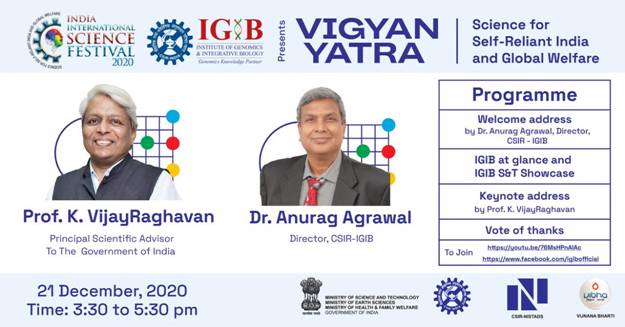In the run up to the India International Science Festival 2020, CSIR-Institute of Genomics and Integrative Biology (CSIR-IGIB), New Delhi participated in the Vigyan Yatra on December 21. The Director of CSIR-IGIB, Dr. Anurag Agrawal, kicked off the online program with a reminder of Article 5A(h) of the Indian Constitution which states that it is the duty of every citizen of India to develop the scientific temper, humanism and the spirit of enquiry and reform, stressing how the solution to many problems of the modern world lie in science. Dr. Agrawal emphasized that the rapid response of the scientific world to fight against the COVID-19 pandemic came from years of investment into good science, irrespective of the classifications of basic and applied.

Prof. K. VijayRaghavan, Principal Scientific Advisor to the Government of India delivering the keynote address noted how building redundancy into our scientific establishments is essential for a fast and nimble response in an emergency such as the COVID-19 pandemic. He spoke about how science in post-COVID era cannot stand isolated but rather had to move forward hand in hand with industry and society. Constant dialogue, challenges and counter-challenges from one to the other are important for us to keep our research relevant and responsive, he added.
A short video was screened highlighting the achievements of IGIB in the areas of genomic medicine. IGIB has a major focus on genomics with special emphasis on genomics of human diseases; from the sequencing of the first Indian genome in 2009 to sequencing the genome of 1000 Indians, to creating a reference database of Indian genomes for precision medicine development. The expertise in genomics also allowed the institute to rapidly sequence large numbers of COVID-19 samples when the pandemic struck India early this year. CSIR-IGIB has also been leading the fight against COVID-19 by developing a paper-based RNA diagnostic system called FELUDA based on the CRISPR-Cas9 system. This development was the result of already ongoing research into developing CRISPR-diagnostics for sickle cell anemia. IGIB is also using stem cell technology to correct genetic diseases such as sickle cell anemia and thalassemia, which has a wide prevalence in the country. Finally, research at CSIR-IGIB has led to the birth of a modern scientific discipline known as Ayurgenomics. Ayurvedic doctors and genomics scientists have over the years worked together to identify a genomic correlate for the Prakriti-based stratification of population used in Ayurveda.
Alagappa University organized a Special Lecture on “History of Indian Science” under the banner of India International Science festival (IISF) through the virtual platform to promote history of science in India. The event was conducted to create awareness amongst the youth about the Indian Civilization and its imprints across the globe. Total 600 participants, including Undergraduate students, post-graduates, research scholars and school students from various colleges, institutes and schools from the Sivaganga District of Tamil Nadu joined the event.
Prof. N. Rajendran, Vice-Chancellor, Alagappa University, Karaikudi mentioned about the very evolution of science as the struggle against nature. He also highlighted that the CharakaSamkitha invented anciently is used for 150 surgeries alongside shusritha.
Prof. S. Sivasubramainan, Former, Vice-Chancellor, Bharathiar University, Coimbatore in his special address emphasized upon the nature, types, fields and need of science through which scientists have plied their craft not because of the importance for glory or material award but to satisfy their own curiosity about the way the world works.
Dr. D.K. Hari, Founder, Bharath Gyan, Chennai in his Keynote speech said, “India has been noted to be the scientific country right from Vedic to modern times with the usual fluctuations that can be expected of any country”.
Shri. V. Parthasarathy, Treasurer, Arivial Sangam, VIBHA Tamil Nadu Chapter felicitated the chief guests. Prof. H. Gurumallesh Prabu, Registrar, Alagappa University delivered the thematic address. Prof. Sanjeev Kumar Singh, Nodal Officer – Alagappa University, IISF 2020 proposed the Vote of thanks. He has also encouraged the participants of the event to join the main event of IISF 2020.
CSIR-National Environmental Engineering Research Institute (CSIR-NEERI) and Vigyan Bharati (VIBHA) organised the ‘Vigyan Yatra’ as part of the 6th India International Science Festival (IISF-2020) and Jigyasa: Student-Scientist Connect Program to nurture scientific temper and inspire young minds. The Vigyan Yatra was organisedto showcase the scientific activities virtually. Students and teachers from KendriyaVidyalayas, NavodayaVidyalayas, Government Schools, etc. from Maharashtra, Madhya Pradesh, Chhattisgarh and other parts of India prominently participated in this programme.
Dr. Rakesh Kumar, Director, CSIR-NEERI in his welcome address cited some interesting examples where science could be applied for betterment of the people and environment. Students can do better if they are innovative, creative, and think out of the box, he added.
Dr. (Mrs) AtyaKapley, Scientist and Head, Director’s Research Cell, CSIR-NEERI outlined the role of CSIR-NEERI in IISF-2020. She informed that CSIR-NEERI would coordinate two major events, namely Women Scientists’ and Entrepreneurs’ Conclave and Sanitation & Waste Management.
Prof. Umesh Palikundwar, Department of Physics, RTM Nagpur University described about the role of VIBHA, Vidarbha Chapter in IISF-2020 and nation building. Dr. K V George, Scientist and Head, Air Pollution Control Division delivered a popular science lecture on ‘Our Atmosphere and Its pollution’. The students interacted with the CSIR-NEERI scientists and cleared their scientific concept. IISF promotional video and Dr APJ Abdul Kalam’s inspirational video were screened on this occasion.
The IISF 2020 is being organised by Council of Scientific & Industrial Research (CSIR) in collaboration with Ministry of Earth Sciences, Department of Science and Technology (DST), Ministry of Health and Family Welfare, Ministry of Earth Sciences, Department of Biotechnology (DBT) and Vijnana Bharati (VIBHA).
